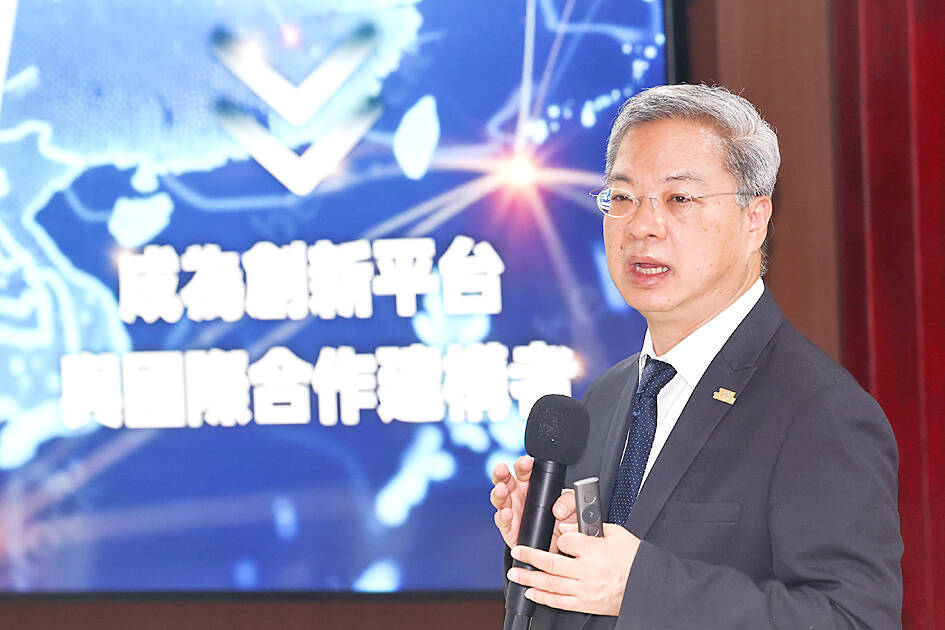Minister of Economic Affairs Kung Ming-hsin (龔明鑫) yesterday said the ministry has contacted the Taiwan Electrical and Electronic Manufacturers’ Association to explore ways to support the association’s proposal to establish technology parks in Mexico, Poland, India and the Philippines.
The ministry has set up trading centers in the Czech Republic, Japan, the US and other markets to help local manufacturers deploy strategically, and would assist them in establishing operations in the countries, Kung told a news conference in Taipei.
However, he downplayed concerns that local manufacturers’ expansions overseas would reduce their operations in Taiwan.

Photo: CNA
The expansions are not industrial relocation, but extensions of firms’ capacity and capabilities, Kung said, adding that the Department of Investment Review would closely monitor the situation.
The ministry would also help Taiwanese manufacturers secure orders from non-US markets to counter high US tariffs, with more opportunities in Europe, Japan, India and South Asia, he said.
Although uncertainty remains about the US’ semiconductor tariff rates pending the outcome of a Section 232 investigation under the US Trade Expansion Act of 1962, Taiwanese chipmakers had already started investing in the US well before tariff talks between Taipei and Washington to ensure smoother operations, he said.
Regardless of the tariffs, the robust demand for artificial intelligence products and high-end servers, and the investments in the technologies by Taiwanese firms, coupled with the government’s policy support for silicon photonics, quantum computing and robotics, would bode well for Taiwanese industries, he added.
Separately, Kung said that state-run Taiwan Power Co (Taipower, 台電) would strive to keep the power grid’s nighttime reserve margin above 6 percent following a fire at Taipower’s Hsinta Power Plant (興達電廠) in Kaohsiung on Tuesday last week and a malfunction at the coal-fired Linkou Power Plant (林口電廠) in New Taipei City on Monday.
The reserve margin, which ensures supply during disruptions such as malfunctions or fires, should exceed 10 percent during the day, while Taipower would keep it above 6 percent at night, he said.
Taipower chairman Tseng Wen-sheng (曾文生) said that it would keep the reserve margin above 6 percent during peak nighttime hours through the end of this month after the deployment of backup units.
While the power supply remains sufficient, pressure remains on the grid due to scheduled repair and maintenance of major generators, he said.
The power supply would further stabilize if a new generator at Hsinta Power Plant resumes operation next month, he added.
Last week’s and Monday’s incidents cut 2.1 gigawatts of power generation, Tseng said.

In Italy’s storied gold-making hubs, jewelers are reworking their designs to trim gold content as they race to blunt the effect of record prices and appeal to shoppers watching their budgets. Gold prices hit a record high on Thursday, surging near US$5,600 an ounce, more than double a year ago as geopolitical concerns and jitters over trade pushed investors toward the safe-haven asset. The rally is putting undue pressure on small artisans as they face mounting demands from customers, including international brands, to produce cheaper items, from signature pieces to wedding rings, according to interviews with four independent jewelers in Italy’s main

Japanese Prime Minister Sanae Takaichi has talked up the benefits of a weaker yen in a campaign speech, adopting a tone at odds with her finance ministry, which has refused to rule out any options to counter excessive foreign exchange volatility. Takaichi later softened her stance, saying she did not have a preference for the yen’s direction. “People say the weak yen is bad right now, but for export industries, it’s a major opportunity,” Takaichi said on Saturday at a rally for Liberal Democratic Party candidate Daishiro Yamagiwa in Kanagawa Prefecture ahead of a snap election on Sunday. “Whether it’s selling food or

CONCERNS: Tech companies investing in AI businesses that purchase their products have raised questions among investors that they are artificially propping up demand Nvidia Corp chief executive officer Jensen Huang (黃仁勳) on Saturday said that the company would be participating in OpenAI’s latest funding round, describing it as potentially “the largest investment we’ve ever made.” “We will invest a great deal of money,” Huang told reporters while visiting Taipei. “I believe in OpenAI. The work that they do is incredible. They’re one of the most consequential companies of our time.” Huang did not say exactly how much Nvidia might contribute, but described the investment as “huge.” “Let Sam announce how much he’s going to raise — it’s for him to decide,” Huang said, referring to OpenAI

The global server market is expected to grow 12.8 percent annually this year, with artificial intelligence (AI) servers projected to account for 16.5 percent, driven by continued investment in AI infrastructure by major cloud service providers (CSPs), market researcher TrendForce Corp (集邦科技) said yesterday. Global AI server shipments this year are expected to increase 28 percent year-on-year to more than 2.7 million units, driven by sustained demand from CSPs and government sovereign cloud projects, TrendForce analyst Frank Kung (龔明德) told the Taipei Times. Demand for GPU-based AI servers, including Nvidia Corp’s GB and Vera Rubin rack systems, is expected to remain high,